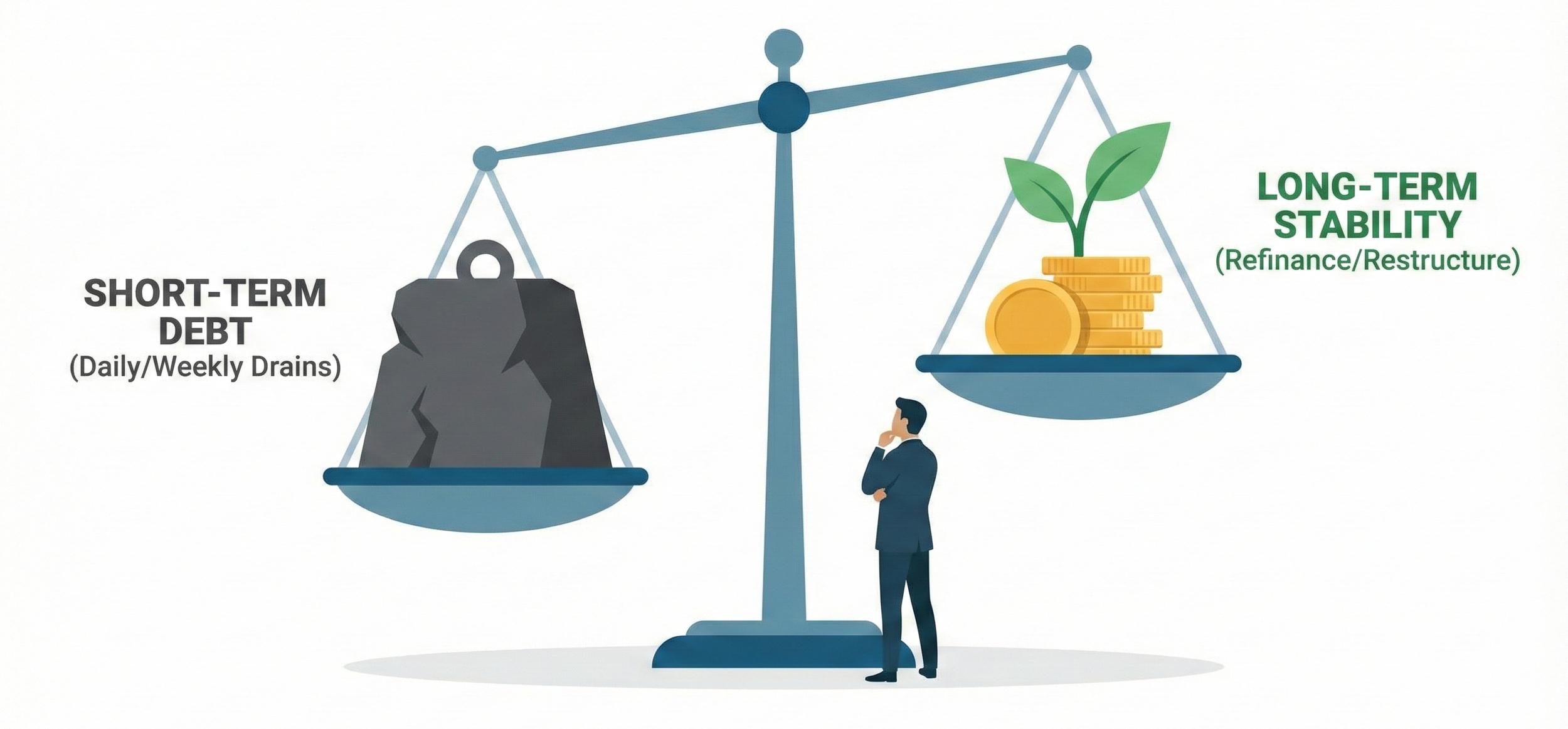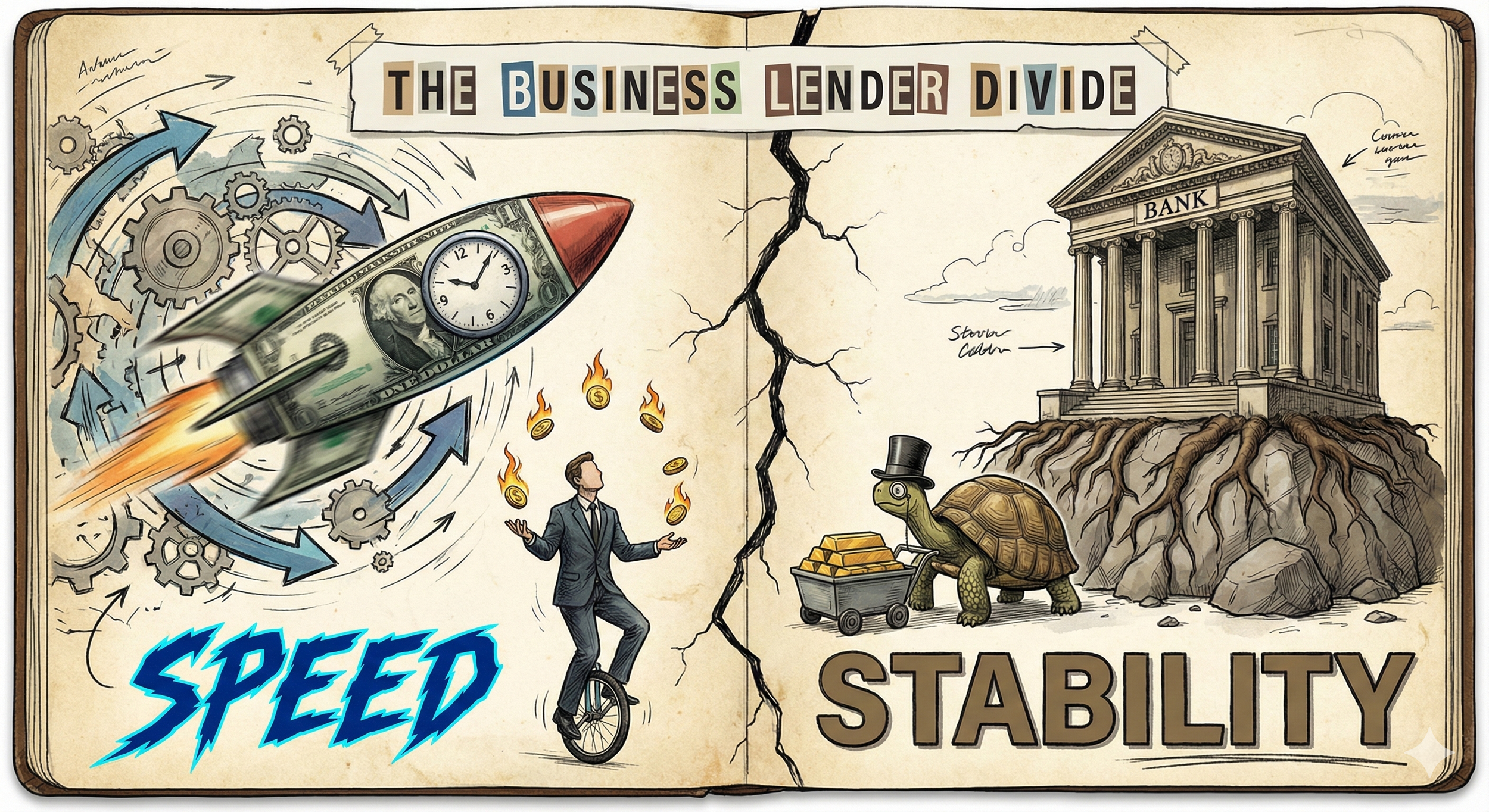General Requirements (takes about 5-minutes or less to apply online)
680+ FICO score (Transunion or Experian FICO model 8.0 or similar)
Less than 15% operating loss in the last year of business
Last 2-Years of filed Business Tax Returns; Last 1-Year of filed Personal Tax Returns
Last 3-months of bank statements; copy of Driver’s License
SBA Loans Offer Unbeatable Capital
and Repayment Terms
The landscape of business funding is vast and often bewildering, ranging from traditional bank loans and lines of credit to venture capital, angel investors, and online lenders.
Each option comes with its own set of terms, interest rates, repayment schedules, and application hurdles.
For many small business owners, particularly those who are just starting out or operate in industries perceived as higher risk, traditional financing avenues can seem like an insurmountable wall. Banks, often risk-averse, tend to favor established businesses with extensive operating histories, substantial collateral, and impeccable credit scores.
This leaves a significant portion of the small business community feeling overlooked and underserved. The frustration of being denied a loan, or being offered terms that are simply not sustainable, is a common experience.
This is where the U.S. Small Business Administration (SBA) loan programs emerge as a beacon of hope, offering a unique and often superior alternative to conventional financing.
They are designed specifically to address the funding gaps faced by small businesses, providing access to capital on terms that are typically far more favorable than what the open market can offer.
Understanding the fundamental nature of SBA loans and how they differ from other financing options is the first step toward leveraging this powerful resource for your business's success. It’s about recognizing that not all loans are created equal, and some are indeed structured with the specific needs of small businesses in mind, offering a pathway to growth that might otherwise be out of reach.
The SBA's mission is to support and empower small businesses, and their loan programs are a direct manifestation of that commitment, acting as a catalyst for economic development and job creation across the nation.
The SBA Advantage: Lowest Cost of Capital
When evaluating financing options, the "cost of capital" is a big consideration as well as length of payback period.
This isn't just about the stated interest rate; it encompasses all fees, charges, and the overall financial burden of the loan. In this critical area, SBA loans consistently outperform most other lending products available to small businesses.
The reason for this lies in the government guarantee.
The SBA doesn't directly lend money, except in disaster relief scenarios.
Instead, it partners with conventional lenders (banks, credit unions, and other financial institutions) and provides a guarantee on a portion of the loan amount – up to 85% for loans under $150,000 and 75% for larger loans.
This guarantee significantly reduces the risk for lenders, making them more willing to offer more attractive terms to small businesses that might otherwise be deemed too risky.
With reduced risk, lenders can afford to charge lower interest rates. SBA loan interest rates are typically tied to the prime rate, plus an allowable spread. While these rates can vary depending on the loan program, size, and maturity, they are generally capped and are significantly lower than what you might find from alternative lenders, such as online lenders or merchant cash advance providers, whose Annual Percentage Rates (APRs) can soar into double or even triple digits.
Beyond the interest rate, SBA loans also come with transparent and often lower fees compared to conventional loans. There are specific guaranty fees charged by the SBA, but these are often more favorable than the upfront costs associated with other forms of financing, which can include hefty origination fees, closing costs, and various administrative charges.
Furthermore, the total cost of capital is also influenced by the repayment period. A longer repayment period, characteristic of SBA loans, means lower monthly payments, which directly impacts your business's cash flow. This allows you to retain more capital within your business for day-to-day operations, strategic investments, or unexpected expenses, rather than being burdened by high, immediate debt obligations.
This financial flexibility, stemming from the lower cost of capital, is a profound advantage for any small business looking to allocate its resources efficiently and sustainably. It frees up cash that can be reinvested in product development, marketing, hiring, or simply building a stronger financial buffer, all of which contribute to the long-term health and growth of the enterprise.
Unparalleled Repayment Periods:
Breathing Room for Growth
Perhaps one of the most compelling benefits of SBA loans, and a major factor in their lower effective cost of capital, is the extended repayment periods they offer.
Unlike traditional commercial loans that often have terms ranging from 3 to 7 years, SBA loans, particularly the popular 7(a) and 504 programs, can stretch repayment over much longer durations.
For working capital and equipment loans, terms can extend up to 10 years, and for real estate loans, terms can be as long as 25 years.
This stands in stark contrast to many conventional business loans and certainly to the very short-term, high-cost options often pitched by alternative lenders.
What does this mean for a small business owner?
It means significantly lower monthly payments.
Imagine the difference in cash flow between paying off a $500,000 loan over 5 years versus 25 years.
The longer term drastically reduces the monthly burden, freeing up valuable cash that can be reinvested into the business, used to cover operating expenses, or held as a strategic reserve. This extended runway provides essential breathing room, allowing your business to grow and mature without the immediate pressure of aggressive debt servicing. For startups or businesses undergoing significant expansion, this flexibility is invaluable. It enables them to navigate the initial leaner periods, invest in long-term assets without crippling their working capital, and build a solid foundation for future profitability. The extended repayment period is not merely a convenience; it is a strategic advantage that directly contributes to the viability and success of a small business, allowing for more sustainable growth and a reduced risk of financial distress. It's about aligning the debt repayment schedule with the natural lifecycle and revenue generation capabilities of a growing enterprise, rather than forcing a square peg into a round hole with rigid, short-term repayment demands.
Navigating the Business Loan Process:
The Role of a Skilled Business Advisor
While SBA loans are more accessible, the application process still requires diligence and a clear understanding of the requirements. This is precisely where the expertise of a skilled business advisor becomes invaluable.
A knowledgeable advisor, specializing in SBA loans, can act as your guide, advocate, and strategist throughout the entire journey. Their role extends far beyond simply filling out forms.
They can help you:
1. Assess Eligibility and Program Fit: With various SBA loan programs (7(a), 504, Microloans, etc.), each with specific uses and criteria, an advisor can help you identify the best fit for your business's unique needs and current financial standing.
2. Optimize Your Application: They understand what lenders look for in an SBA loan application. This includes helping you present your financial statements, business plan, and projections in the most favorable light, highlighting strengths and addressing potential weaknesses proactively.
3. Prepare a Comprehensive Loan Package: A skilled advisor ensures that all necessary documentation is meticulously gathered, organized, and complete, minimizing delays and increasing the chances of a smooth review. This often involves assisting with business plans, financial projections, and personal financial statements.
4. Connect with the Right Lenders: Not all banks are equally active in SBA lending, and some specialize in certain types of SBA loans or industries. An advisor often has established relationships with a network of active SBA lenders, matching you with one most likely to approve your specific loan request.
5. Address Challenges and Questions: If questions or challenges arise during the underwriting process, an advisor can help you respond effectively and navigate any complexities, bridging communication gaps between you and the lender.
6. Increase Approval Chances: By ensuring your application is strong, complete, and targeted to the right lender, an advisor significantly increases your likelihood of loan approval. Their expertise can help you avoid common pitfalls that lead to rejections.
7. Save Time and Reduce Stress: The application process can be time-consuming. An advisor manages much of the legwork, allowing you to focus on running your business.
The investment in a skilled advisor can pay dividends by streamlining the process, improving your chances of approval, and ultimately securing the funding you need on the most favorable terms. It's akin to having a seasoned professional navigate complex legal or tax matters; their specialized knowledge saves you time, money, and reduces risk.
Beyond the Loan:
Long-Term Success with an Advisor
The value of a skilled business advisor doesn't end with loan approval. Their support can extend well into the post-funding phase, contributing to your business's long-term success.
Many successful SBA loan recipients continue to leverage the insights of their advisors to ensure the effective utilization of funds and ongoing financial health. An advisor can help you:
1. Manage Cash Flow Effectively: With new capital, it's crucial to manage cash flow judiciously. An advisor can help you create robust financial models and budgets to ensure the loan proceeds are used strategically and sustainably.
2. Monitor Financial Performance: They can assist in setting up key performance indicators (KPIs) and regularly reviewing financial statements to track progress, identify potential issues early, and make informed decisions.
3. Strategic Planning and Growth: As your business grows, an advisor can help you refine your business strategy, identify new opportunities, and plan for future expansion, whether it's through additional financing or organic growth.
4. Compliance and Reporting: SBA loans come with certain reporting requirements. An advisor can ensure you remain compliant, avoiding any issues that could jeopardize your loan status.
5. Problem Solving and Pivoting: The business landscape is dynamic. When unexpected challenges arise, an advisor offers an objective perspective and can help you strategize effective solutions or necessary pivots.
6. Building a Stronger Financial Foundation: Over time, an advisor can guide you in building stronger financial practices, improving your creditworthiness, and positioning your business for future financing needs, perhaps even without the need for an SBA guarantee down the line.
Their ongoing partnership transforms them from a mere loan facilitator into a trusted confidant and strategic partner, dedicated to your business's enduring prosperity. This holistic approach to business advising is a testament to the value of a skilled professional who understands the intricacies of both finance and business operations.
General Requirements (takes about 5-minutes or less to apply online)
680+ FICO score (Transunion or Experian FICO model 8.0 or similar)
Less than 15% operating loss in the last year of business
Last 2-Years of filed Business Tax Returns; Last 1-Year of filed Personal Tax Returns
Last 3-months of bank statements; copy of Driver’s License
Understanding Loan Uses:
Flexibility for Every Business Need
One of the often-overlooked benefits of SBA loans is their incredible versatility in terms of how the funds can be utilized. Unlike many specialized loans that are restricted to a single purpose (e.g., equipment financing or real estate loans), SBA 7(a) loans, the most common type, offer a wide range of permissible uses, making them suitable for almost any legitimate business need. This flexibility is a significant advantage for small business owners who often have multifaceted funding requirements. The funds from an SBA 7(a) loan can be used for:
1. Working Capital: To cover day-to-day operational expenses, manage seasonal fluctuations in revenue, or bridge gaps in cash flow. This is crucial for maintaining liquidity and ensuring smooth operations.
2. Purchasing Equipment: From machinery and vehicles to office furniture and computer systems, SBA loans can finance the acquisition of essential business equipment.
3. Real Estate Acquisition or Renovation: This includes purchasing land, existing buildings, constructing new facilities, or renovating current business premises. The long repayment terms make this particularly attractive for real estate investments.
4. Inventory Purchase: To stock up on raw materials or finished goods, allowing businesses to meet demand and manage supply chains effectively.
5. Business Acquisition: For entrepreneurs looking to purchase an existing business, an SBA loan can provide the necessary capital, often allowing for a lower down payment compared to traditional acquisition financing.
6. Debt Refinancing: Consolidating existing, high-interest business debt into a single, lower-interest SBA loan can significantly improve cash flow and reduce overall interest costs.
7. Startup Costs: While challenging, some SBA programs and lenders are willing to fund new businesses, covering initial expenses like marketing, legal fees, and initial inventory.
8. Leasehold Improvements: Investing in improvements to leased commercial space to better suit business operations.
9. Franchise Fees: For individuals looking to purchase a franchise, SBA loans are often a preferred financing method for franchise fees and initial setup costs.
10. Export Activities: Specific SBA programs, like Export Express, are designed to help businesses engage in international trade, covering working capital needs related to export sales.
This broad applicability means that an SBA loan can be a comprehensive solution for diverse business needs, rather than requiring multiple, disparate financing arrangements. This simplifies financial management and often results in more cohesive and manageable debt.
Beyond the Numbers:
The Intangible Benefits of SBA Loans
While the tangible benefits of SBA loans – lower cost of capital and longer repayment periods – are compelling, there are also significant intangible advantages that contribute to a small business's overall health and reputation. Securing an SBA loan can enhance your business's credibility and financial standing in the long run.
1. Enhanced Credibility: Obtaining an SBA loan from a reputable bank can signal to suppliers, partners, and even potential investors that your business has undergone a rigorous review process and has been deemed creditworthy by a credible financial institution, backed by the U.S. government. This can open doors to better terms with vendors and improved partnership opportunities.
2. Disciplined Financial Management: The application process itself often forces business owners to develop a comprehensive business plan, detailed financial projections, and organized financial records. This discipline, while demanding, lays a strong foundation for future financial management and strategic decision-making.
3. Access to Mentorship and Resources: The SBA is not just a loan guarantor; it's a comprehensive resource for small businesses. Many SBA programs offer or connect borrowers with business counseling, training, and mentorship services through organizations like SCORE or Small Business Development Centers (SBDCs). This access to expert advice can be invaluable for navigating challenges and seizing opportunities.
4. Building a Banking Relationship: For many small businesses, an SBA loan can be their first significant loan from a traditional bank. Successfully managing and repaying an SBA loan builds a positive credit history with the bank, paving the way for future conventional financing needs without the SBA guarantee.
5. Government Backing Confidence: Knowing that your loan is backed by the U.S. government can instill a sense of confidence and security, particularly during economic uncertainties. It provides a level of stability that might not be present with other, less regulated financing options.
6. Fair and Transparent Terms: SBA loans are subject to government regulations, ensuring a degree of fairness and transparency in terms, fees, and conditions, protecting small business owners from predatory lending practices often found in less regulated markets.
These intangible benefits contribute to a more robust and resilient business, extending the value of an SBA loan far beyond the monetary capital received. They foster a culture of sound financial practices and provide a supportive ecosystem for small business growth.
A Call to Action:
Your 5-Minute Pre-Qualification Check
The benefits of SBA loans are clear, and the reality is that they are more accessible than many business owners realize, especially with the right guidance.
The good news is, you don't have to commit to a full application to see if you're a good candidate. Many reputable lenders and online platforms now offer a quick and easy pre-qualification process for SBA loans.
This process typically takes 5 minutes or less and, crucially, will NOT hurt your personal or business credit score.
This is because pre-qualification involves a "soft inquiry" on your credit, which does not impact your credit score like a "hard inquiry" that occurs with a formal loan application. It's a risk-free way to get an initial assessment of your eligibility and potential loan terms.
Here's how to take advantage of this opportunity:
1. Find a Reputable Lender or Online Platform: Look for banks or online lending marketplaces that clearly advertise SBA loan pre-qualification with a soft credit check.
2. Provide Basic Business Information: You'll typically be asked for information such as your business name, industry, time in business, annual revenue, desired loan amount, and a few personal details.
3. Get Instant Feedback: Within minutes, you'll receive an indication of whether you pre-qualify and what loan options might be available to you.
This simple step can provide invaluable insight and save you significant time and effort. It's the perfect way to demystify the SBA loan process and understand your options without any commitment or credit impact. Don't let misconceptions or fears of complexity prevent you from exploring what could be the most advantageous financing solution for your business.
Taking the Next Step: Partnering for Success
If you pre-qualify for an SBA loan, the next logical step is to engage with a skilled business advisor who specializes in SBA financing. While the pre-qualification provides a preliminary green light, an advisor will help you transform that potential into a successful loan approval and, more importantly, a well-managed infusion of capital that fuels your business's growth.
They will guide you through the full application process, ensuring all documentation is precise and complete, and working with you to present your business in the best possible light to lenders. This partnership extends beyond the transaction, offering strategic financial advice and support for the long haul.
Remember, an SBA loan is not just about getting money; it's about securing the right money on the right terms to ensure the sustainable and profitable growth of your small business. Don't hesitate to take that initial 5-minute pre-qualification step. It could be the first step towards unlocking unparalleled financial opportunities for your enterprise.
General Requirements (takes about 5-minutes or less to apply online)
680+ FICO score (Transunion or Experian FICO model 8.0 or similar)
Less than 15% operating loss in the last year of business
Last 2-Years of filed Business Tax Returns; Last 1-Year of filed Personal Tax Returns
Last 3-months of bank statements; copy of Driver’s License
WHAT IS THE BEST AND SAFEST WAY FOR YOUR BUSINESS TO DEAL WITH HIGH BUSINESS DEBT PAYMENTS?
It is NOT by stopping ACH payments.
It is NOT by taking on another business loan.
It is NOT ALWAYS a Refinancing
It is NOT by entering into a debt settlement program.
Find out the BEST strategies to get your Business back to where it was



















